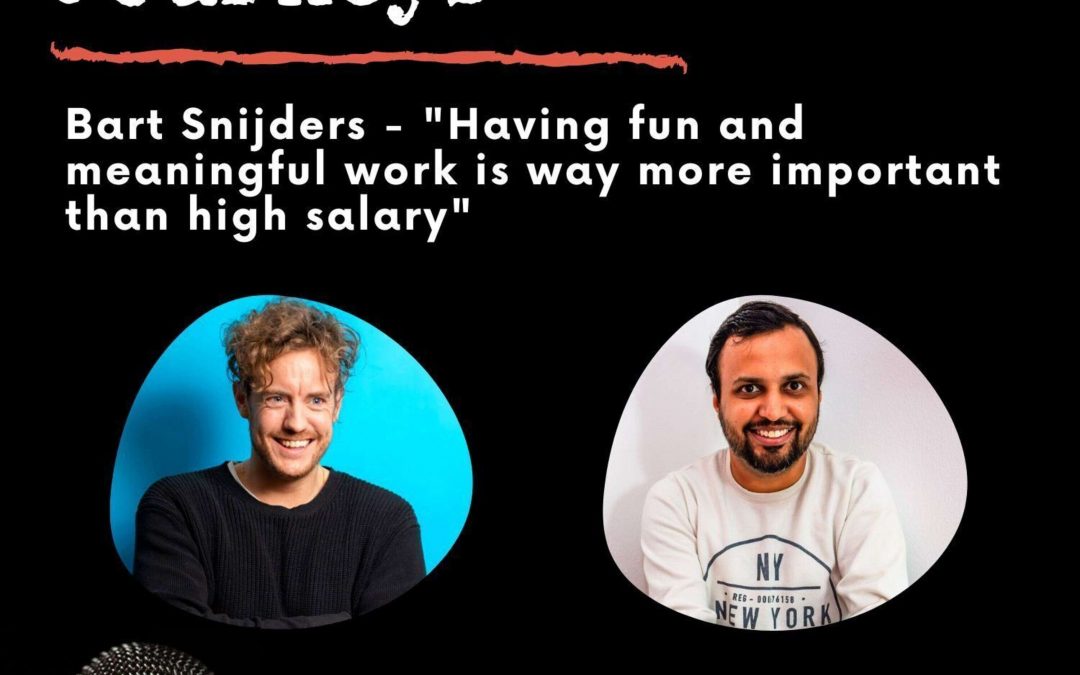This is the Leadership Journey series on the Choosing Leadership Podcast.
I believe we all have a lot to learn from each other’s stories – of where we started, where we are now, and our successes and struggles on the way. With this series of interviews, my attempt is to give leaders an opportunity to share their stories and for all of us to learn from their generous sharing.
In this interview, which is one of the longest ones I have done because both of us were having so much fun, Bart talks about his goal to offer meaningful and fun work to a thousand people. We also talk about the value of stopping and celebrating and what all happens under the surface of spoken words when it comes to people, conversations, and leadership. You do not want to miss listening to this one.
You can find Bart at the below links
- https://www.linkedin.com/in/snijdersbart/
- https://www.sprintsandsneakers.com/
- https://twitter.com/Bart_Snijders
In the interview, Bart shares
- A big part of my life is my family. So it’s definitely worth mentioning. And, uh, yeah, there’s no book words written how to raise a kid.
- I try to create like a unique company culture and create a legacy with it can inspire other companies as well, how we work together.
- I believe that people can do everything if they want it bad enough.
- We don’t really judge on what you can do at this point, but we look at people at the potential. Like the learning capacity, how fast can they learn something? How willing are they to go the next mile and, and to really push towards the result? And I think that’s failure is a big part of our culture here.
- I am nothing more than anyone else here. It doesn’t matter if you’re like, if you have a hundred million or not, if you have super smart, super, pretty like rural people. And I think that’s the base of the culture here under leadership, uh, how we try to do it and try to help each other.
- I want to offer a thousand people meaningful and fun work. ’cause I think for a lot of people, work is something you need to do to get paid for. And I really believe that it should be a lot of fun and it should be meaningful.
- Psychological safety is one of the most important things for high-performance teams.
- I don’t offer people work, but offer people meaning. I give them the opportunity to do meaningful work and contribute like, if you look back in 10 years or 20 years, and even like at the end of your life, you can look back and say, Hey, you know, this is what I left behind. This is how I changed the world a bit.
- Most people in my team understand that having fun and meaningful work is way more important than having a high salary.
- You can never put revenue in front of mental or like even physical health in any way.
- I think we’re the top 50 fastest-growing companies in the Netherlands. And, uh, this is something that we can really be proud of. So I’m really thankful.
- I try to be a good example. So to my teams, uh, I tried to walk in the office like at a different time. Just to, to, to show them that you don’t have to be at nine, like nine to five now, please. Now. And I go to the gym in the middle of the day to show them, and I try not to send slack messages in a weekend or evenings, but to give you the example as well, and, and to, to have that flexibility and to, to be in control of your own life.
- Working for 14 hours straight – that’s the stupidest thing you can do.
- I think in general, like if you can do six hours really productive work a day, and I think you’re very busy and then you can do some like email stuff around it. Please like go to the gym and then work because you will be way more effective and. Yeah, which I do try to support that in older, all the way we can similar as mental health.
- Life is – you cannot, you can never put a filter on everything. I thought it was also stuff that you need to deal with. And people that say that they don’t have any issue. Like. They’re lying because everybody has their own sort of shit.
- I think being a, being a parent is kind of very related to being a leader. because it helps you, first of all, focus on something bigger than yourself. It helps you focus on long term rather than just thinking of short term, uh, many times the way children deal with things. It teaches you a lot.
- If you really look at communication, then words might be the least important thing. You can feel so many different things when you communicate and when you’re leading. And I’m very aware of that energy that I bring.
- Recently I went to a colleague and, and when I was at a desk, she starts crying and I just, I, I saw it. I felt that I needed to be there, but in the past I would never have been capable of doing this because I was not aware of, uh, I was just listening to words, looking at people.

